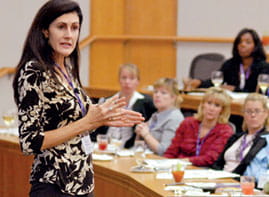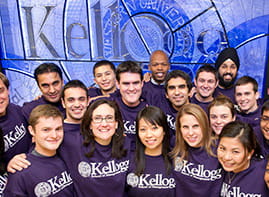Students, alumni and industry leaders help businesses through tough times at 2008 Turnaround Management Conference
4/28/2008 - “This economy is incredible,” said Diane Swonk, Mesirow Financial’s chief economist. Demand for chartered jets and $3,000-handbags is way up, she said, but family restaurants are closing down because their customer base can’t afford to eat out anymore. It is, she added, an “extraordinary situation we’re in today.”
For the second consecutive year, Swonk was a keynote speaker at the Kellogg School’s student-led Turnaround Management Conference. The April 23 event drew students, faculty, staff, alumni and distinguished turnaround managers to the James L. Allen Center for a day of keynote addresses, panel discussions and case studies.
“Last year, I talked about the bifurcation of the economy,” said Swonk, referring to her remarks at the 2007 conference. “It’s not just that the rich are getting richer — there’s more of them.”Today, she said, members of lower income brackets are “moving down the value chain” of goods and services: Middle-class Americans are consuming less takeout and more bargain-priced groceries, and the poorest citizens are running out of options.
Swonk said the too-little-too-late cynicism surrounding recent federal economic stimulus packages is misplaced. “Well, of course it will [make a difference]. It’s amazing what Republicans and Democrats figure out in an election year.” But, she added, it will take more than creative tax incentives to keep the U.S. economy on track. “The only thing that will restore this economy is time and confidence,” she stated.
Following Swonk’s address and throughout the day, conference attendees were given a choice of panel discussions to attend. According to conference co-chair Yelena Shklovskaya ’09, participants in all of the panels explored their topics with a Kellogg frame of mind: “Instead of focusing on one most common or most current aspect of a turnaround — such as distressed investing or the legal aspects of Chapter 11 — the panels really took more of a ‘general manager’ approach that is so central to a Kellogg education.”
 |
| Andy McKenna, the non-executive chairman of McDonald's Corp., discussed the fast-food giant's successful turnaround in his afternoon keynote address. |
| Photo © Nathan Mandell |
 |
| Harwinton Capital CEO Jerry York delivered the final keynote address at the 2008 Kellogg Turnaround Management Conference. |
| Photo © Nathan Mandell |
In the morning panel, “Choosing and Maintaining the Right Management Team,” moderated by Kellogg finance lecturer William Sutter, panelists returned frequently to another core Kellogg value — teamwork.
“Unless there’s an instance of fraud or malfeasance, you almost never want to make wholesale changes [to the management team] all at once,” said panelist Michael Buenzow, senior managing director of FTI. The existing team is the best source of company information for a turnaround manager, he explained.
Panelist Andy Chidester ’95, the managing director of Duff & Phelps, added that when it is necessary to pare a management team, it’s important to educate the remaining members on the challenges and opportunities ahead.
Participants in the panel, “The First 100 Days of a Turnaround,” discussed the crucial initial steps to success. Clinical Entrepreneurship Professor Barry Merkin moderated.
“The first hundred days is all about speed, all about time and all about cash,” said James Mesterharm ’99, managing director of Alix Partners.
Participants agreed that locating sources of dormant cash was a priority for the early days of a turnaround, and panelist Dan Wikel ’00 reminded the group that the first 100 days is also the right time to start repairing business relationships damaged by the previous leadership. “We’ll walk into situations, particularly where we’re working side-by-side with the management, and say, ‘When was the last time you talked to your lenders?’” said Wikel, a managing director with Huron Consulting Group. “It’s going to be painful,” he added, but that first phone call to neglected lenders should be placed as early as possible.
Midday keynote speaker Andy McKenna emphasized the importance of customer service in his account of McDonald’s’ turn-of-the-millennium turnaround. McKenna, the non-executive chairman of McDonald’s Corp. and a member of numerous Chicago-based nonprofit boards, said McDonald’s was suffering in the 1990s because it had gotten carried away with non-essential work. “We had lost our focus on our core business,” said McKenna, a former chairman of both the Chicago White Sox and the Chicago Cubs. “In short, we had taken our eyes off the fries.”
A renewed focus on the customer experience earlier this decade, McKenna said, is still in full force today, and McDonald’s quarterly profits continue to climb: “We have learned that taking care of our people has a real impact on the bottom line.”
The afternoon’s final keynote was Harwinton Capital CEO Jerry York, who is also a director of Apple Inc. and Tyco International Ltd. — two companies that have enjoyed successful turnarounds against all odds. York compared these turnarounds with those of IBM (where he was senior vice president and chief financial officer in the early 1990s) and Chrysler Corp. (where he held a series of positions, including executive vice president and chief financial officer, during his 14-year tenure).
Though the circumstances of each turnaround are different, he said, there are certain characteristics they all share. “You’re going to be working 80 hours a week for a long, long time, your spouse is going to be mad at you, and you’re going to be tired,” York said, echoing earlier conference sentiments about finding a management team up to these and other challenges.
York added that the future of turnarounds likely will be tied to the “shifting economic center of gravity” — companies will live or die by their ability to navigate the new global economy. “This is what’s going to affect the work lives of students in this room,” he said.
The conference concluded with a networking reception.






